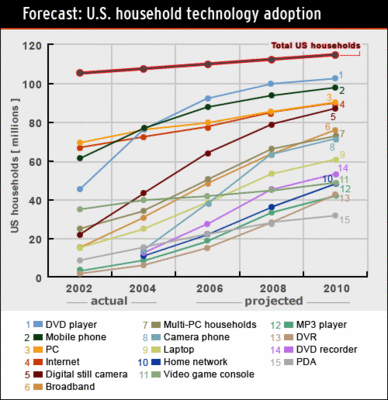Posts on quality, life, culture, the media, news & tech with a twist & a slice of Limey. I moved my blog to http://renaissancehambara.jp in December 2006, go there for the latest content.
Wednesday, August 31, 2005
When I worked during the dot.com boom I briefly used a great free document management service called FireDrop to manage approvals from press releases to appraisal forms for my team. There has seldom been a web service that has impressed me since, however BaseCamp looks like it might do that.
Unlike many web services offerings that I won't name (RightNow Technologies, Groove Networks) it is truly platform-agnostic.
Monday, August 29, 2005


My friend Heather and I were pod (as in cubicle) neighbours at the same agency for 2 1/2 years. The last time we worked together was almost five years ago. However we have managed to keep in touch over the past five years via email on an irregular basis, the occasional phone call and kept up to speed with the happenings in each others lives. Heather is a classic example of a loose connection within my network.
One which would not have been realistically possible without the benefit of email. This network maintenance with people who I have known through different phases of my life is a key example of how the Internet has altered our social fabric and social networks such as LinkedIn, SoFlow and Orkut have tried to codify this process.
The value of this connection to me is very tangible, Heather met me at San Francisco airport, gave me a tour of Silicon Valley and on my one night off, took me to the Sunnyvale town market and custom car show.
Being in a strange place and being able to kick back with a friend who is a local, but at the same time gets where you are coming from was priceless. Being able to find a bar with a proper Irish fry up with black and white pudding makes her even more valuable!
I got to see a more human personal Silicon Valley than some of my peers who dismiss the place as being dull. Certainly Sunnyvale felt small, but then why wouldn't it when most of the major employers provide most of lifes requirements on giant campuses and you can buy everything else at the out-of-town Walmart or Target store. Being a European I was reminded of the small town mythology perpertrated in US films like American Grafitti, Back the Future and ET. Having been to Sunnyvale it all made sense.
Saturday, August 27, 2005


Back to '88: Utah Style
Utah, land famous for dry salt lakes, mob financiers and polygamy has appeared in the buzz on the blogosphere following on an email sent to the Interesting People email list. A rave was broken up by camoflaged men who turned out to be the local SWAT team (what a bunch of grown men lurking in the bushes in the middle of the night with various animals were actually doing is anyone's guess).
It reminded me of the efforts of the British police back in the day to stamp out the house music movement back in '88, instead it has mutated and spread all over the world.
Here is a live video of the event, the local TV news network's coverage and here is the promoters side of the story.
Friday, August 26, 2005
Audience figures at cinemas have dropped in the US and the movie industry is working out what it can do about it. Michael Lyndon, chairman of Sony Pictures Entertainment told the New York Times: "Part of this is the fact that the movies may not have lived up to the expectations of the audience, not just in this year, but in years prior," said Michael Lynton, chairman of Sony Pictures Entertainment, which had some flops this summer, including the science fiction action movie "Stealth" and the romantic comedy "Bewitched." "Audiences have gotten smart to the marketing, and they can smell the good ones from the bad ones at a distance."
Thursday, August 25, 2005
Interesting Business 2.0 Wireless Report: Mobile Content Goes Mainstream (US media companies wake up to it) live from San Francisco airport

Interesting Business 2.0 Wireless Report: Mobile Content Goes Mainstream (US media companies wake up to it) live from San Francisco airport
However you cannot ignore the power of US programming (such as Lost, CSI, 24) and the creativity the US media companies bring. It will be interesting to see how the likes of Time Warner catches up to and competes with European mobile media players.
Wireless Report: Mobile Content Goes Mainstream
Big media wants to deliver content through your mobile phone. At least that's what can be gleaned from Tuesday's announcement that Time Warner (parent company of Business 2.0) made a strategic $7.5 million investment in Glu Mobile during its most recent round of venture funding. Glu, based in San Mateo, Calif., is one of the pioneers in the burgeoning mobile entertainment market. Since it was founded four years ago, Glu has pushed the wireless platform as a standard for consuming rich media with its collection of videogames, ringtones, and sports applications for cell phones.
The investment from Time Warner is significant for two reasons. First, it provides the company with additional cash to help finance its ongoing global expansion.
Second, and more important, it opens the doors for Glu to make popular Time Warner content deliverable over mobile devices. While the investment doesn't guarantee access to Time Warner's stable of brands, it's a sterling endorsement. Glu has already established licensing agreements with Time Warner's Cartoon Network and will launch additional products based on the network's popular "Adult Swim" programs later this year. Glu chief executive Greg Ballard sees it as a precursor of deals to come. "It gives us access to their corridors," he says, "and should lead to some very interesting products."
In exchange Time Warner receives something equally important: a clear view into the mobile industry. As part of the agreement, which took a year to hammer out, Turner Broadcasting System president Andy Heller will receive a seat on Glu's board of directors. From this perch Heller can see firsthand just how complicated it is to bring a product to market across thousands of different handsets and hundreds of carriers. In Glu, Time Warner gets a partner that has established distribution agreements with nearly 90 wireless carriers worldwide and has developed a reputation for being able to bring products to market quickly. "This business is incredibly complex," Ballard says. "At this point it would be very complicated to start from scratch."
It's the size of the market that makes it impossible for media companies to ignore. For the foreseeable future, the cell phone will remain primarily a tool for making phone calls. Eventually, however, it will become a platform that serves many different forms of media, from music to movies. By 2008 more than 2 billion people around the world will own mobile phones. If just 10 percent of these cellular owners use their phones to view news clips, play games, listen to music, or consume any other form of media, that's a multibillion-dollar opportunity for media companies and mobile content publishers alike. "Nobody wants to miss this," Ballard says.
Other media moguls are certain to follow Time Warner's move. Barry Diller and John Malone are said to be looking at potential investments. They are both seeking ways to extend their existing properties -- Expedia.com or Match.com, in Diller's case -- and the mobile platform is a logical next step. No other product in the world is as ubiquitous as the mobile phone; it's one of the few devices consumers carry with them everywhere. News Corp. and Disney have already made strategic investments of their own. Fox Mobile Entertainment is working with another mobile content publisher, I-Play, to bring the hit television show 24 to subscribers' mobile phones. Meanwhile, Disney has set up its own wireless division to find ways for Mickey Mouse and other popular characters to make their way onto handsets. In other words, it's only a matter of time before consumers will be offered their favorite media content on their cell phones.
©2004 Business 2.0 Media Inc.
Sent with Snapper Mobile Mail
www.snappermail.com
Monday, August 22, 2005
The 10-hour flight was not something that I looked forward to as I don't like flying at the best of times, I did manage to catch bits of the first two episodes of Lost and the remake of Flight of The Pheonix on the inflight entertainment system, which I thought was ironic.
I was picked up by my friend Heather, I found Silicon Valley itself quite strange. Firstly the light is a lot brighter to the UK and has a blueish tinge. The newness of everything you see around you, its like Milton Keynes or Telford. The real estate is expensive yet all the buildings are low rise, in this day and age Japanese cities built on similar earthquake faults manage to build higher.
The Apple campus in particular looked really non-descript, it was hard to believe that Apple products could spring from such an unpromising looking set of buildings.
Tipping is de rigeur in restaurants (add double the sales tax on to your bill). Prices for things like hotels generally don't quote sales tax.
Saturday, August 20, 2005
 Retro Moment
Retro MomentStussy have been bringing back some of their classic designs as part of their 25th anniversary. You can see some of them showcased on their new UK website here.
Whilst we are on the subject of retro, I wrote a brief contribution for Always On: the piece sprang out of my thoughts on what the killer app is for the internet. For me the primary benefit is email access via my broadband connection and on the move via my Treo, emails position as the must-have application has been the same for the past 10 years.
That got me thinking about what technologies are due a second stab at the big time now that broadband access has become commonplace, you can read the piece here.
Friday, August 19, 2005
 CringelyVision
CringelyVision Mark Stephens aka Bob Cringely is one of the reasons that I have worked in the technology, media and telecoms sector for the past 8 years.
His book Accidential Empires: How the boys of Silicon Valley made their millions, battle foreign competition and still couldn't get a date gave me a good background in the area that seemed to impress the hell out of my colleagues for some bizarre reason.
A big lawsuit over the Cringely name and several years of web columns later, Bob is making the transition to rich media on the web. Since he is well known within in the industry, he has attracted great guests on a downloadable video programme. The kind of people that move the world, but still won't be seen on the BBC.
Bob was the first person that I read to wake up to PayPal, not surprisingly, the programme will have an interview with the founder. You can watch more when NerdTV goes live on September 6th.
 The Cobblers Son
The Cobblers SonThe old saying goes that the cobbler's son is always the worst shod, so PR companies are often bad communicators when it comes to talking about themselves. A recent example of this is the way chris lewis of lewis pr has allegedly been screening all the derogatory comments about the means in which he has built the agency.
Blogs are the 'fresh meat' business opportunities that PR agencies think they can provide clients with 'value-added' services on (rather like webcasting, PR management extranets and internet press rooms 5 - 7 years ago). So agencies are now experts in the area of communicating via blogs (the buzz phrases to watch out for are micro media, the long tail, stakeholders, blogosphere, the viral nature of information).
As any agency would tell you, blogging is as much about developing a dialogue as opposed to one-way communication. Firstly look at chris' pristine blog post here and then the discussions about the mysteriously missing comments here. Hmmm (Kudos to Spin Bunny).
Tuesday, August 16, 2005
 Peer-to-peer sneakernets
Peer-to-peer sneakernets I remember reading once that Microsoft did research on the best way to move data around a business. Mass storage and a courier, 'the sneakernet' won.
Going through the latest series of TV show 24; despite the latest Cisco gear, the tech agents use CDs and DVDs to move data around the CTU facility.
So its no surprise that the RIAA has finally woken up to the fact that P2P networks aren't as huge a threat after all, but it was evil CD burners all along.
Copy protection is the only way to stop customers stealing from the music industry. The only way to protect consumers becoming criminals...
In the meantime, the music industry is being hollowed from the inside out as its campaign against downloaders has been a massive publicity stunt for Apple's iTunes Music Service; everyone now knows what an MP3 is and that it allows blank CD can now hold 64 CDs worth of pirated content.
"Burned'' CDs accounted for 29 percent of all recorded music obtained by fans in 2004, compared to 16 percent attributed to downloads from online file-sharing networks, said Mitch Bainwol, chief executive for the Recording Industry Association of America.
The data, compiled by the market research firm NPD Group, suggested that about half of all recordings obtained by music fans in 2004 came from authorized CD sales and about 4 percent from paid music downloads.
``CD burning is a problem that is really undermining sales,'' Bainwol said in a phone interview before addressing about 750 members of the National Association of Recording Merchandisers in San Diego on Friday.
Sunday, August 14, 2005
I came across a consumer profile test called VALS (values and lifestyles) which was designed to better understand consumer behaviour. The test factors in issues such as demographics and earnings but since the test is based around two key axis of resources and innovation, my guess is that the results will be skewed; an individuals resources and what they do with them are likely to be affected by the social trend of massclusivity (a combination of technology changes, the economics globalisation and consumer demands that has put a lot of 'exclusive goods' in the grasp of the everyman).
VALS was developed by SRI Business Intelligence (as in the same Stanford Research Institute that Doug Engelbart worked for and invented modern computing in the mid-to-late 1960s).
Find out your VALS type here.
 Geek Stuff
Geek Stuff Bill Gurley of top-tier VC fund Benchmark Capital has a dated but interesting overview of the market for multi-player online gaming environments here.
Gurley's article has some interesting statistics on how much the business is worth in different Asian communities. There has already been empirical evidence of how large this is based on the cultural impact of it. Like the Japanese wife who sold her husband's virtual posessions in the game as a way of getting revenge. The police prosecuted her, just they way the would have if she'd poured paint on his possessions or cut up his clothes. The Chinese man who went and killed another game player who would not return a magic sword that he had been lent, or the Korean man who keeled over and died after playing online for 50 hours straight.
I attended the Open Tech conference the other weekend. The organisers have put videos of the main lectures online in case that you missed something because of a clash of timings between the two streams that the presentations took, or didn't attend in the first place. Listen or view here.
Tech's favourite snake oil salesman and evangelist George Gilder is interviewed (complete with the obligatory podcast) on AlwaysOn (registration required). Tech ramblings absorbed from tech sector spin mixed with intelligent design and neo-conservatism.
Saturday, August 13, 2005
 Why I'd like to see the Mac on Intel
Why I'd like to see the Mac on IntelApple's announcement that it was moving the Mac platform to Intel processors offers a new opportunity to Apple users. Japanese users have long benefits from ultra-portable laptop like the Panasonic one pictured, it would be great to have a Mac device of the same size. Something Apple hasn't sold since the PowerBook Duo series a decade ago.
With the rise of the laptop as an indispenable student tool and Wi-Fi now available everywhere that you can buy overpriced coffee, a laptop that is the size and weight of a small text book has more appeal. In the same way that Apple opened up the market for MP3 players, even though Compaq and been there before, so it could open up the market for sub-notebooks beyond Japan.
Tuesday, August 09, 2005
 This is the end my friend
This is the end my friend In Apocalypse Now, you know things are coming to a conclusion with the droning soundtrack of The Doors droning on. In the case of Britain's North Sea oil fields we are well up the river past the Play Boy bunnies and into the heart of darkness. Production had peaked a while ago and Britain is now a net importer of crude oil and natural gas. However the departure from UK oil productionof Kerr McGee, one of the North Sea's pioneers and a stalwart in UK oil production for the past 30 years gave the signal to many that The Doors were droning through the speakers and Colonel Kurtz would soon be dead.
Pioneer producers are expected to move on to new offshore fields in the Far East, the Canadian oil sands and deep offshore fields in the Gulf of Mexico, leaving behind the oil industry hyenas like Apache or Talisman who specialise in getting the maximum financial return out of mature / declining field yields, feeding on the morsels left behind.
Every food chain needs its hyenas, but there is the fear of who is going to pay the bill for the environmental repair when the well is spent?
Kerr McGee's departure was in part triggered by Carl Icahn the infamous 'greenmailer' who specialised in hostile takeover bids to improve shareholder value and is often associated with the junk bond funded excesses of the 1980s along with his peers including the likes of Ivan Boesky and Michael Milken. Kerr McGee bought Icahn off, benefiting none of the other shareholders and turning their own stock to junk status. In order to reduce its debt exposure a departure from the UK was required.
The name Kerr McGee has a solidity about it that traditional US oil industry companies had like Kellogg, the Hughes Tool Company, the Hamilton Brothers Petrolite or ARCO. Their logotype and design reflecting solidity like a Paul Rand design. The kind of solidity that John Wayne portrayed on screen as Chance Buckman of the Buckman Company, 'Oil Well Fire and Blowout Specialists' in The Hellfighters. The machismo, silver suits and fire of this film when I was a kid inspired me to work in the oil industry. Weedy names and insipid logos like Beyond Petroleum wouldn't have attracted me to the industry and represent a business where the vitality is now largely dissapated.
 The rational consumer
The rational consumerWhen I was at college I did economics modules. The hypothetic models build by economists assumed that consumers made rational choices all the time. This was a marketing degree and the consumer behaviour aspect of the course dispelled this assumption. However, according to Trendwatching.com this economist view of the world may not be too far off at all.
Hygienia is a modern marketplace of mature consumers who know where what all the hygiene factors are for any good or service that they purchase. This tends towards what economists call 'perfect market knowledge' since if you can categorise the key attributes you can make a rational design based on price.
Consumers are able to cut a swath through corporate and marketing messages to get to the information that matters to their buying decision. In a way that was promised with Wired magazine's vision of the new economy, the internet has improved consumer knowledge and research. For instance gamers know that the likely European-specification Sony PSP is likely to have region-locked games and an inferior quality screen compared to the Japanese products so are using the web to buy parallel imports faster than Sony can close down their lines of supply.
Successful products and services fit into a continuum consisting of six different categories:
- Free love - cheap to free - most of the web including Wikapedia or the Metro newspaper. The business problem this presents is when consumers become used to getting something for free how do you get them unwillingly to use a paid-for item? One of the few successes in this area would the iTunes Music Store, the New York Times Online is trying to square this circle now.
- Cheap heaps - lowest of the low pricing - easyGroup products, Lidl, Aldi. Offerings based on discounts that are too good to be true
- No Frills Chic - cheap but well designed - IKEA, H&M. Think cheap heaps with style and or humour.
- Mass class - the new standard, based on products that would have been considered luxury such as Starbucks coffee, Ben & Jerry's ice cream. Whilst many brands believe this is where they sit, they often don't add up on the hygiene factors.
- Massclusivity - the new standard for mass luxury such as adidas limited editions or personalised items like Warholised baby photos that seem to be popular with yummy mummies
- Uber premium - Seriously rich products - Maybach limosine, a corporate charter jet and Audemars Paget watches
Monday, August 08, 2005
 (Picture courtesy of Unilever)
(Picture courtesy of Unilever)Does my ass look like orange peel to you?
Dove's original UK execution of its campaign for beauty integrated marketing programme got a lot of criticism for voting boxes that allowed subversion of the advertising message, and was parodied by the likes of HolyMoly. Now the latest campaign for firming products based on the campaign for real beauty has prompted a great article on Slate how Dove's Campaign for Beauty, whilst pretending to be about empowering women and allowing them to define beauty for themselves merely replaces one insecurity for another.
Cellulite is a skin condition that affects skinny celebrities and bloated housewives alike, up to now it was a '
Saturday, August 06, 2005
 New Citrus Technology Empowers Communications
New Citrus Technology Empowers Communications According to news coverage of the latest campaign by Which Magazine, up to one in seven mobile phones break down within the first 12 months.
Nokia and Samsung were found to be the most reliable, Motorola and Sony Ericsson weren't. It was no surprise that mobile network 3, was found to be the most prone to defective handsets and service.
For 3's lamely spun but amusing rebuttal of the report findings go here, for details on how to sort out your defective handset get advice here.
It was disappointing to see both Motorola and Sony Ericsson come off badly. I used to find the phones of pre-merger Ericsson used to be overengineered, robust and very reliable. In addition, I thought that Motorola had long ago turned the corner on quality from the time when they had the iconic but unreliable StarTac handsets.
Friday, August 05, 2005
 Citizen Media
Citizen MediaIts all very well talking about how blogging and cameraphones are making the average joe the new media, its another thing to build a business model around it and put your money where your mouth is. Now anyone can become a paparazzi or news photographer with Scoopt, a picture agency who promises to treat camera phone snappers the same way as professional photographers. Kudos to netimperative for the pointer.
Thursday, August 04, 2005
 In The Mood For Tech
In The Mood For TechWhen I studied at college I was told that the chocolate manufacturers loved a recession. As people were insecure or depressed they bought more chocolate. According to News.com, Forrester Reseach has come to a similar conclusion about some gadgets. They have broken consumers down by income (high and low) and by the attitude to technology (optimistic or pessimistic). This seems to be a simplified model of their technographic profiles. The research is based on upon questioning the same sample for the past eight years on an annual basis.
I am sure that the product portfolios would shift around somewhat in Europe but what is interesting is way that the marketing channels to tackle all four groups are so delineated.
(Credit Forrester Research)
- High-income optimists - word-of-mouth campaigns via podcasts, traditional tech hardware marketing with bulleted 'bits and bytes' lists of product features (sod the benefits) and low-cost search advertising
- Low-income optimists - Marketers need to emphasize price and features to reach this group online or offline. Bought their PC at Aldi
- High-income pessimists - Marketers pitch in with a simpler offer, a stronger brand and an offline approach; ideal segment for Apple then
- Low-income pessimists - The most interesting and least rewarding in terms of average revenue per user. Marketers to target using television advertising; mainstream messages incorporating fear, greed or lust; and carefully manage their customer support costs. Does this mean that its wrong to use booth babes at tech conventions?
Wednesday, August 03, 2005
 On Heavy Rotation Part Two
On Heavy Rotation Part Two- Trans Slovenian Express EP - Weird title, weird concept. Mute Records have got four Slovenian artists to record Kraftwerk cover versions. First off Laibach, who seem to have done their own Kraftwerkesque remix of one of their own tracks. The ace in the hole is Alinia - Home Computer, a definite floor filler in more jackin' clubs
- Brett Johnson - Best intentions for failed inventions. Though the title on this release for Classic may convince you that you are buying the recording studio equivalent of the abortion bucket, you'd be wrong. Johnson has produced four tracks that have something to please everyone.
- STLP15 - Stupendous Music - A mixed EP of dub and tech house that Worship Recordings would have been proud of.
- Fazed Idjuts feat. Sally Rodgers - Dust of Life - First of all Sally Rodgers should need no introduction as the vocalist in a A Man Called Adam. Then if thats not enough deep house legend Joe Claussell has done the remix duties giving a piano and guitar led remix respectively.
Tuesday, August 02, 2005
- Run Jeremy - Windowlicker - a reworking of the Aphex Twin classic so that it can be played in a house set.
- This Ain't Chicago - Ride the rhythm - French record label Parisonic commissioned two re-tweaks of the early British house classic.... 'ride the rhythm, ride the floor, ride till you can't ride no more'
- Incognito - Don't you worry 'bout a thing - Talkin Loud reissued this wedding standard for the 30-somethng generation, but the real gem is Out Of The Storm
- Lovejuice - Ripped to the tits / Acid love - smiley for a record label, acid basslines. What more do you need?
- Lorna - Jumpin jack flash - old school jack trax vocal samples put together for dancefloor mayhem by a bunch of German pranksters
- Mario Fabriani / Majik J - Detour EP - West Coast label uses Kiwi and Italian talent to create stonking West Coast style house. I am sure there is something post-modern about this in a shipping coals to Newcastle kind of way
Monday, August 01, 2005
 Something just doesn't add up
Something just doesn't add upThe web is now host to the world's fastest growing media format for advertising. It's what's blowing smoke up the ass of Google's share price. At the moment it accounts for a single digit percentage of advertising spend, but 15 per cent and growing of people's eyeball time.
- Television revenues including advertising however are circling the plug hole prior to disappearing down the drain:
- Proliferation of TV channels and transmission vehicles (digital terrestrial signals, satellite, cable)
- Move away by marketers from brand building campaigns to direct response campaigns that produce more PowerPoint and Excel-friendly data
- According to figures from the MPAA revenues from pay television have been declining
- Pay-per-view demonstrating a very low growth rate in revenue according to the same MPAA
So it was with some interest that I read this Economist article Telecoms, television and the internet: the war of the wires on the way that telecoms companies are investing in IPTV as a big play to drive revenue. The figures tend to indicate that 'cable TV over phone lines' has a hard time entering ahead of it entering a mature marketplace. Telecoms companies have previously made a dogs dinner of handling media businesses, which is why they have often sought to partner with specialists in the area of online content provision. If the telecoms companes take a similar approach on IPTV then it is worth looking at the growth of the net as alternative guideline. If the previous growth of the net is anything to go by only 5 per cent of the people in the IPTV field is likely to be commercially successful with their offerings.
How will regulators handle and affect the marketplace for IPTV and how will the offering be subverted and used by early adopter consumers?
From a media company perspective IPTV is a double-edged sword, its a revenue stream, but it exasperates the 'shortening' of the window that media companies have to make money on a property. This picture becomes clearer when you read the Slate article Hollywood Death Spiral - the secret numbers tell the story.
